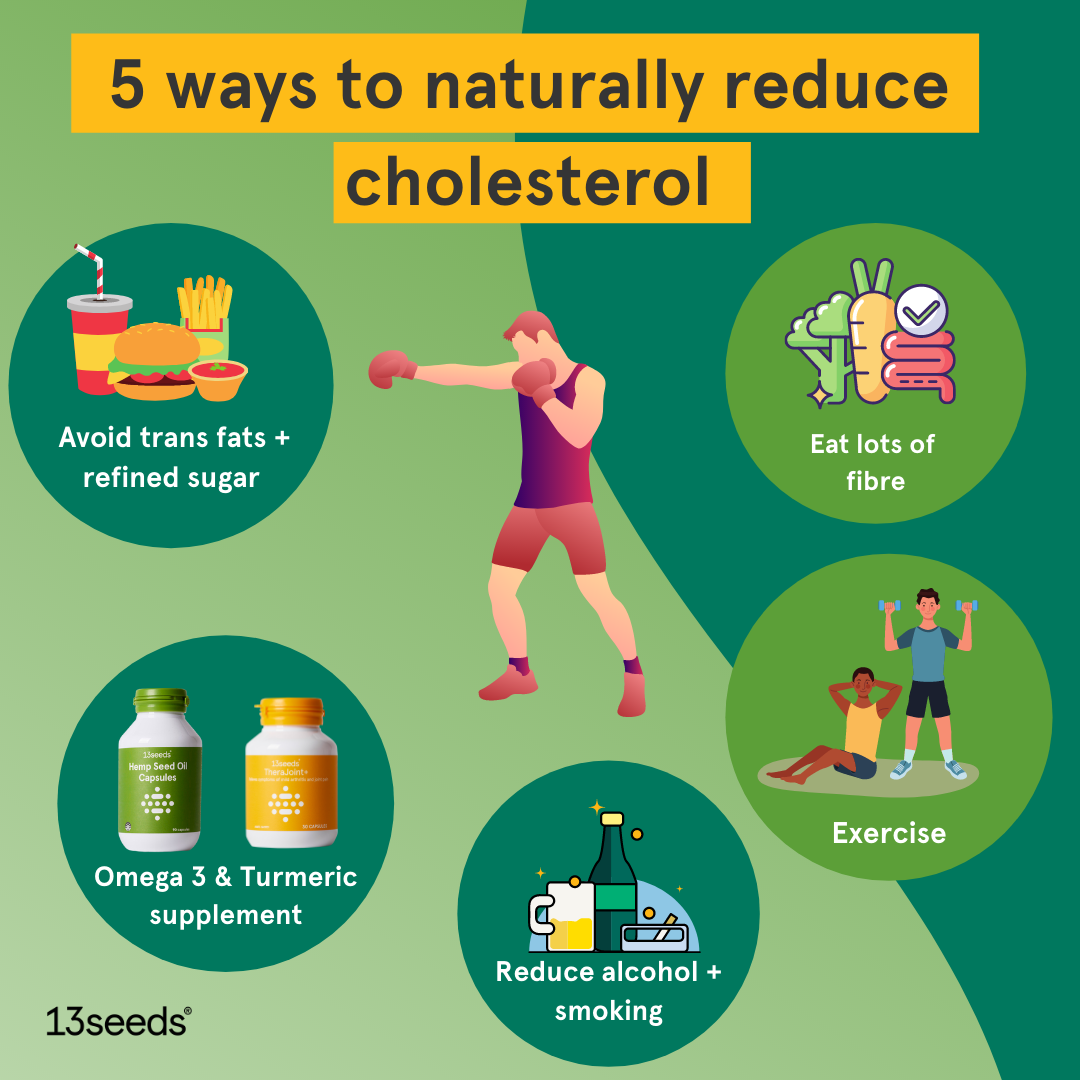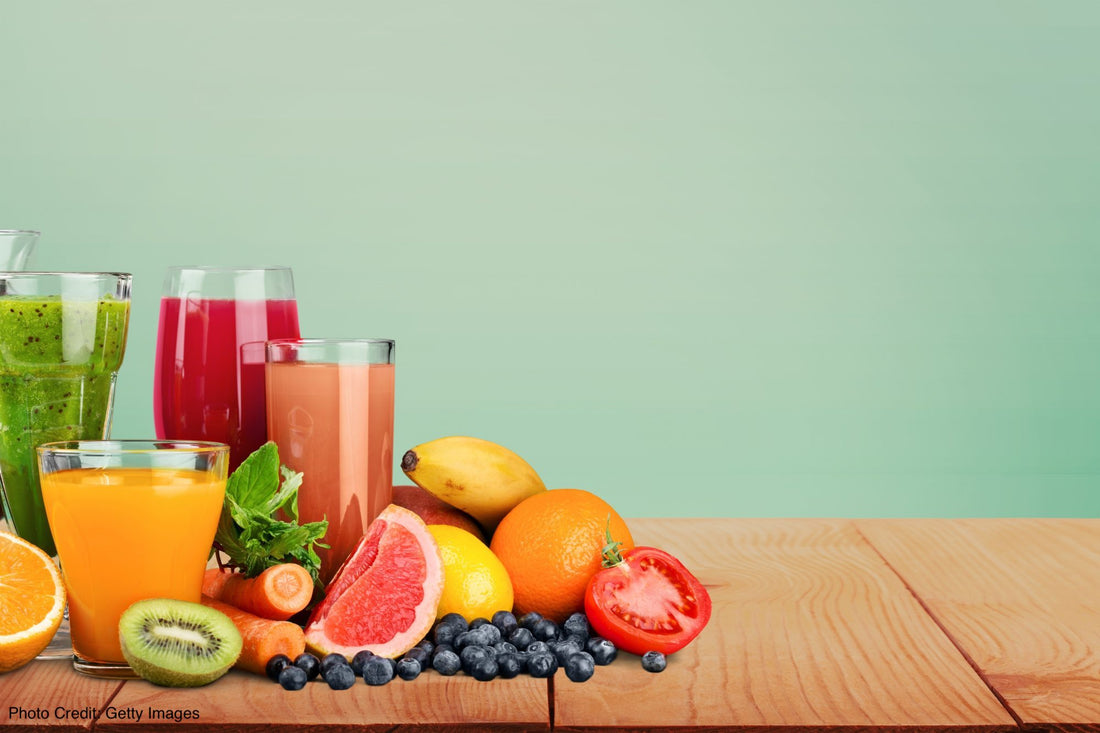Hey legends! Welcome back to another edition of 3 question Friday where our head nutritionist Ben debunks all his favourite nutrition and health myths asked by you!
In this weeks edition you’ll find out whether juicing or blending is better for you, how eating a plant-based diet can improve your health and fight climate change, and how to naturally lower your cholesterol without statins!
Congratulations to Gemma, Lewis, and Amy who all won $20 gift vouchers just for asking Ben a question! You can always send your questions to ben@13seeds.com.au
Let’s dive into this week’s questions:
1. Gemma: What’s healthier - juicing or blending?
The juice vs blending debate is a hot topic, but which one is better for your health and what’s the difference? The main difference between juicing and blending is what nutrients are left at the end.
Juicing is the liquid extracted from fruits and vegetables. While juice contains lots of nutrients including vitamins, minerals and antioxidants, this process also removes majority of the dietary fibre found in fruits and vegetables.
Fibre is important as it helps to keep our digestive system healthy by feeding our gut bacteria (via fermentation). It also has an anti-inflammatory effect by producing short chain fatty acids (SCFA) by our gut bacteria and can help keep us feel fuller for longer that can assist with weight loss (1, 2, 3).
Soluble fibre dissolves in water and slows down digestion, while insoluble fibre adds bulk to your stool and stimulates action of intestines (you can learn more about fibre here).
Furthermore, due to the lack of fibre, juice is typically high in sugar. High sugar diets can raise blood sugar levels leading to insulin resistance and increase your risk of diabetes (4).
However, when blending a smoothie, you keep most of the fibre while also maintaining vitamins, minerals and antioxidants.
Juicing advocates have suggested that vitamins and minerals are more easily absorbed when fruits and vegetables are juiced because the fibre is removed, while in theory this sounds plausible, I couldn’t find any real solid evidence for this.

Juicing Strengths
- Contains vitamins, minerals & antioxidants
- Easy way to get nutrients into the diet fast
Juicing Weaknesses
- Removes most of the fibre
- High in sugar (risk factor for diabetes)
- May not be filing
Blending Strengths
- Contains vitamins, minerals & antioxidants
- Contains more fibre
- Can easily add other important nutrients (eg. protein and healthy fats)
- Easy way to get nutrients into the diet fast
- More filling
Blending Weaknesses
- Still not as good as whole-foods
- Can still raise blood sugar (less than juicing)
- May contain more calories
What’s the verdict?
Both juicing and blending are a great way to increase vitamins, minerals, and antioxidants in the diet. However, juicing contains less fibre that is important for digestive health and weight loss. One way to overcome this barrier is to consume your juice with a healthy meal.
Smoothies are a better source of fibre that support digestion and raise blood sugar levels far less than juicing while still containing a similar amount of nutrients.
We still believe it’s best to get your nutrients from whole foods the way nature intended to get the most out of your fruits and vegetables.
However, due to our busy lifestyles both juicing and blending can be a valuable preparation tool to get more nutrients into your diet fast – so take your pick!
2. Lewis: How can I lower my cholesterol without statins?
Cholesterol levels are a strong indicator of heart disease. LDL is generally considered to be ‘bad’ cholesterol and HDL is generally considered to be ‘good’ cholesterol. People with ‘high cholesterol’ typically have high LDL levels and low HDL levels (8).
If you have ‘high cholesterol’, it is likely that your doctor has prescribed you statins. Statins are a type of prescription medication that is the first line treatment generally recommended by doctors.
Statins may sometimes be necessary for cases of really high cholesterol that needs immediate action to lower the risk of heart attack and stroke (9).
The good news is if you have mild to moderately high cholesterol you may be able to lower your cholesterol levels through both diet and lifestyle and reduce the need for prescription drugs like statins.

Here are 5 simple tips to help you naturally reduce your cholesterol.
1. Avoid trans fats and refined sugars
While saturated fats may not as bad as we once thought, trans fats and refined sugars have demonstrated to negatively affect our cholesterol levels and increase our risk of heart disease (10, 11, 12, 13).
Aim to eat mostly polyunsaturated fats (eg. hemp seeds, fatty fish), followed by monounsaturated fats (eg. olive oil) and less saturated fats, while avoiding refined sugars as much as possible.
2. Eat lots of fibre
Fibre is the indigestible part of plant foods, such as vegetables, fruits, grains, beans and legumes.
Increasing your fibre intake can help to lower cholesterol levels. A 2010 review concluded that high fibre diets can help to lower LDL levels, while also reducing the risk of type 2 diabetes, heart disease and cancer. Aim to eat 30-40g fibre/day (14).
3. Exercise
As your weight increases so does your risk of high cholesterol. Losing weight can help to reduce your cholesterol. Cardiovascular exercise is a great way to lose weight and reduce your LDL cholesterol (15, 16).
Cardiovascular exercises include walking, jogging, biking and swimming. Aim to exercise for minimum 30-60 minutes daily.
4. Reduce alcohol & smoking
Alcohol and smoking can increase your LDL cholesterol. A study of 7481 men and women over an 8-year period found that high alcohol consumption and smoking increased LDL cholesterol and lowered HDL cholesterol that is associated with heart disease (17).
Reducing your alcohol intake as much as possible and quitting smoking can help to improve your cholesterol levels.
5. Try these supplements
Omega 3 fatty acids found in hemp seed oil and fish oil may help to reduce cholesterol. Studies suggest that omega 3 fatty acids can help reduce triglycerides (fats in the blood) and reduce inflammation that’s linked to heart disease (18).
Curcumin, the active ingredient in turmeric may also help to reduce cholesterol. A 2010 meta-analysis conducted by the Nutrition Journal assessed several studies found that “Turmeric and curcumin may protect patients at risk of CVD through improving serum lipid levels. Curcumin may be used as a well-tolerated dietary adjunct to conventional drugs” (19).
3. Amy: Are 13 Seeds products vegan?
We often get this question… Yes, most the products at the time of posting are 100% vegan (all except our Hemp Seed Oil capsules).
Plant-based diets are all the rage these days for many reasons that include reduced risk of chronic conditions such as obesity, diabetes, heart disease, high blood pressure, and may even increase longevity! (5)
UN experts have stated that switching to a plant-based diet can also help to fight climate change by reducing greenhouse gas emissions caused by methane from livestock and land clearing.
A major report conducted by the UN's Intergovernmental Panel on Climate Change (IPCC) said that Western cultures high consumption of meat and dairy produce is fuelling global warming (6).

You don’t have to cut out meat entirely, just by reducing your consumption meat and dairy consumption can help to improve your health and fight climate change!
Furthermore, industrial hemp has been scientifically proven to absorb more CO2 per hectare than any forest or commercial crop. Add this with a reduction in animal products and you’ll be doing not only your health a favour, but the environment too! (7)
If you have any questions or need support with your health, feel free to email our head nutritionist Ben at ben@13seeds.com.au
Disclaimer:
This article does not constitute medical advice and does not take into consideration your personal circumstances. Please see your medical professional before implementing the above.
References:
- https://onlinelibrary.wiley.com/doi/full/10.1111/j.1467-3010.2008.00705.x
- https://onlinelibrary.wiley.com/doi/full/10.1111/apt.13248
- https://www.sciencedirect.com/science/article/abs/pii/S0268005X16303800
- https://pubmed.ncbi.nlm.nih.gov/23657152/
- https://www.ncbi.nlm.nih.gov/pmc/articles/PMC3662288/
- https://www.ipcc.ch/2019/08/08/land-is-a-critical-resource_srccl/
- https://hemp-copenhagen.com/images/Hemp-cph-Carbon-sink.pdf
- https://www.ahajournals.org/doi/full/10.1161/01.ATV.20.3.830
- https://onlinelibrary.wiley.com/doi/abs/10.1111/j.1582-4934.2001.tb00172.x
- https://journals.plos.org/plosone/article?id=10.1371/journal.pone.0009434
- https://link.springer.com/article/10.1007%252Fs11883-005-0062-9
- https://pubmed.ncbi.nlm.nih.gov/26429077/
- https://www.bmj.com/content/351/bmj.h3978/rr-11
- https://www.sciencedirect.com/science/article/abs/pii/S0268005X09001611
- https://www.nature.com/articles/0803304
- https://www.nejm.org/doi/full/10.1056/NEJM199807023390103
- https://academic.oup.com/aje/article-abstract/126/4/629/166195
- https://academic.oup.com/ajcn/article-abstract/54/3/438/4694393
- https://nutritionj.biomedcentral.com/articles/10.1186/s12937-017-0293-y







